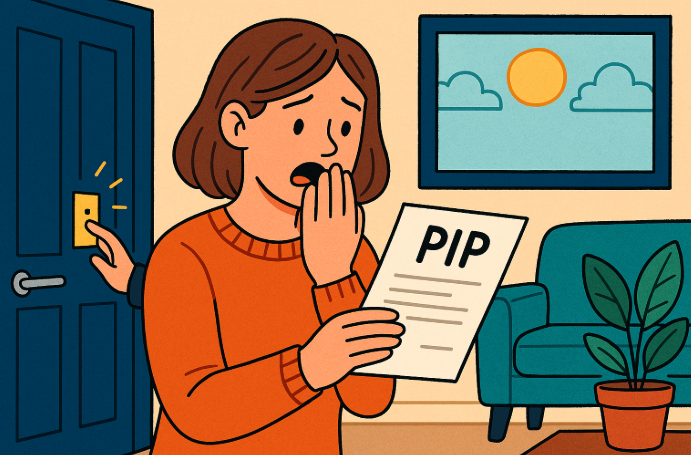Personal Independence Payment (PIP) is a vital benefit for people in the UK living with long-term illnesses or disabilities. It helps cover the extra costs of daily living and mobility difficulties. While most claimants expect clear communication from the Department for Work and Pensions (DWP), there are instances where PIP can be stopped without notification, causing confusion, financial stress, and uncertainty.
This guide explains when and how your PIP payments could stop without warning, and more importantly, what steps to take to challenge the decision, whether you’re a claimant or an adviser supporting someone through the process.
We’ll cover:
-
The most common reasons PIP might stop without notice.
-
How to spot if your claim has ended or been suspended.
-
Step-by-step instructions to challenge decisions.
-
Advice from official sources like gov.uk and expert guidance from charities like Citizens Advice.
If you’re wondering, “Can PIP be stopped without notification?” — the short answer is yes. But there are clear ways to respond, dispute, and resolve these cases with the right information.
What Is PIP and How Does It Work in the UK?
Personal Independence Payment (PIP) is a non-means-tested benefit provided by the Department for Work and Pensions (DWP) to support individuals aged 16 and over who have a long-term physical or mental health condition or disability. It is intended to assist with the additional expenses related to everyday life and mobility issues.
PIP replaced the Disability Living Allowance (DLA) for adults and is divided into two main components:
-
Daily Living Component – for those who need help with everyday tasks such as washing, dressing, preparing food, or communicating.
-
Mobility Component – for those who need support moving around or planning and following journeys.
Each component is paid at either a standard or enhanced rate, depending on the severity of the impact of the claimant’s condition. Payments are made directly into the claimant’s bank account every four weeks and are not affected by income, savings, or employment status.
PIP is assessed based on how a condition impacts a person’s life, not the condition itself. Claimants usually undergo an independent health assessment carried out by a qualified professional, alongside a review of their medical and personal evidence.
Who qualifies for PIP and what are the assessment criteria?
To qualify for PIP in the UK, claimants must meet specific eligibility conditions. These include:
-
Age requirement: You must be aged 16 or over but under State Pension age when you start your claim.
-
Residency: You must have lived in England, Scotland, or Wales for at least 2 of the last 3 years and currently be in the country when applying.
-
Condition duration: Your illness or handicap must have persisted for at least a year, or be anticipated to do so.
How are PIP payments structured and when are they reviewed?
PIP consists of two components:
-
Daily living: 8 possible points across activities like cooking and managing treatments.
- Mobility: 12 possible points covering planning journeys and physical movement.
Awards are set for a fixed term, often 1, 2, 5, or 10 years. The award letter states the end date and whether a review or reassessment will follow.
What triggers a reassessment or award end date?
A reassessment may be triggered by:
-
Medical evidence suggesting change in condition
-
Approaching the fixed term’s end
- A significant change in personal circumstances (e.g. hospital stay).
LSI terms: benefit award expiry, periodic review, case reassessment.
How do I cancel my PIP?
If you no longer need PIP:
-
Contact DWP via your PIP helpline or in writing to formally notify them.
-
Explain that you wish to end your claim and why.
-
Return any recent review forms or miss future reviews – DWP will then close your claim.
-
Report any relevant changes in circumstances as required by law.
What is the 3‑month rule for PIP?
The 3-month rule is part of the PIP qualifying period, a requirement set by the DWP to ensure that the condition a claimant is experiencing is not temporary. This rule ensures consistency in assessing long-term disabilities.
To qualify for PIP:
-
Your disability or health condition must have impacted your daily life or mobility for at least the past 3 months, and
-
It must be expected to continue for at least the next 9 months from the date of your claim.
This rule applies to both mental and physical health conditions. The aim is to ensure that PIP is awarded to individuals whose needs are ongoing and not short-term. Even if a condition is diagnosed recently, you may still qualify if you can show symptoms and limitations have been present for at least 3 months prior.
Can PIP Be Stopped Without Notification?
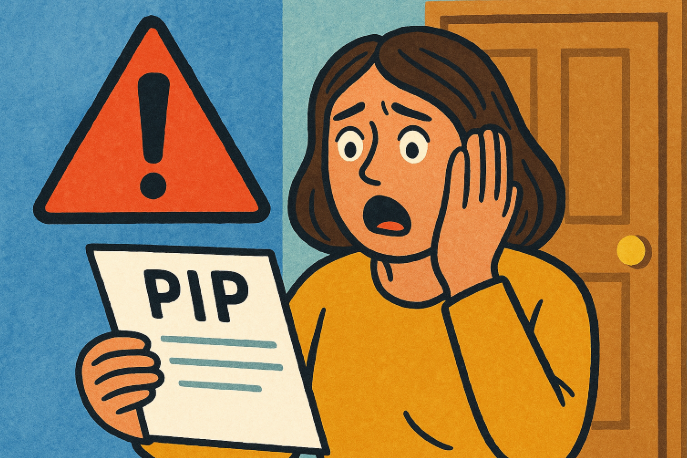
Although the DWP typically provides written notice before suspending or stopping Personal Independence Payment (PIP), there are exceptions where this may not happen, leading to unexpected disruption in payments.
In most cases, the DWP will send a letter explaining the reason for suspension or termination and will outline any appeal or review rights. However, some claimants report payment stops occurring without prior warning, especially when:
-
A fixed-term award has ended.
-
The DWP has not received review documentation.
-
The claimant failed to attend an assessment.
What does the DWP policy say about notice before stopping PIP?
The official DWP policy outlines that claimants should be notified in writing if their award is going to change or end. This includes a decision letter following reassessment or a review outcome.
However, in situations such as:
-
Failure to return a PIP2 review form
-
Non-attendance at a scheduled assessment, or
-
Change of circumstances not reported by the claimant
…the DWP may proceed to suspend or terminate the award before the claimant is fully informed.
Is notification required when a fixed-term award expires?
Not necessarily. While the initial award letter will include a fixed end date (e.g., “your award will end on 1 November 2025”), the DWP is not obligated to send another reminder as that date approaches.
If a review form hasn’t been issued in time, or the claimant hasn’t responded to earlier contact, the award may simply end. Payments will stop on the expiry date, and any unpaid or delayed reviews will not extend the benefit automatically.
This means that claimants must be proactive in tracking the end date of their PIP and contacting the DWP well before expiry to ask about a review, especially if they haven’t received any paperwork.
What does “no award extension” mean for recipients?
When a review is carried out and the DWP decides not to renew the PIP award, the claimant will receive a decision letter explaining the outcome. If no review is carried out because of administrative or timing reasons, the award can lapse without formal denial or extension.
The term “no award extension” typically means:
-
The fixed-term award has ended.
-
No further award has been made.
-
The claimant is not automatically entitled to continued support.
This situation can lead to gaps in payment and a need to submit a new claim if the review opportunity was missed or not provided in time.
What Are the Main Reasons for PIP Being Stopped Suddenly?
PIP can be stopped unexpectedly for a range of reasons, often tied to a failure in process or communication. Common triggers include:
-
Missing a scheduled medical assessment.
-
Not returning a PIP review or reassessment form on time.
-
Changes in condition not being reported promptly.
-
Evidence that the claimant no longer meets the eligibility criteria.
-
A DWP decision following a review or reassessment.
Can failure to return a PIP review form lead to suspension?
Yes. The DWP sends review forms (commonly called the PIP2 “How Your Disability Affects You” form) before the award expires. Failure to complete and return the form by the deadline can result in automatic suspension or termination of your benefit.
While a reminder is usually issued, claimants often report:
-
Receiving forms late
-
Losing forms in the post
-
Being physically or mentally unable to respond in time
If the form is returned late, claimants may have to start a new claim from scratch unless good reason is provided for the delay and accepted by the DWP.
What if the claimant misses a PIP medical or telephone assessment?
Missing a scheduled PIP assessment—whether face-to-face, telephone, or video—without a valid reason can lead to a decision being made without full evidence, often resulting in a denied or stopped claim.
Valid reasons for missing an appointment could include:
-
Medical emergency
-
Mental health crisis
-
Family bereavement
In some cases, DWP may offer a rescheduled appointment, but if the claimant doesn’t respond to communication or if the reason isn’t accepted, payments can be paused or terminated.
Does a change in circumstances automatically stop PIP?
Certain life changes can affect eligibility:
-
Hospital stays over 28 days
-
Prison sentences
-
Absence abroad beyond 13 weeks
-
End of entitlement to immigration support
Payments may halt automatically, often without explicit notice.
Is suspected fraud a reason for stopping PIP without warning?
Yes. If the Department for Work and Pensions (DWP) suspects fraud, they have the authority to suspend PIP payments immediately without issuing advance notice. This can happen if they receive evidence—either through internal data checks or third-party reports—that suggests a claimant may have provided false information or is no longer entitled to the benefit.
How often is PIP reassessed?
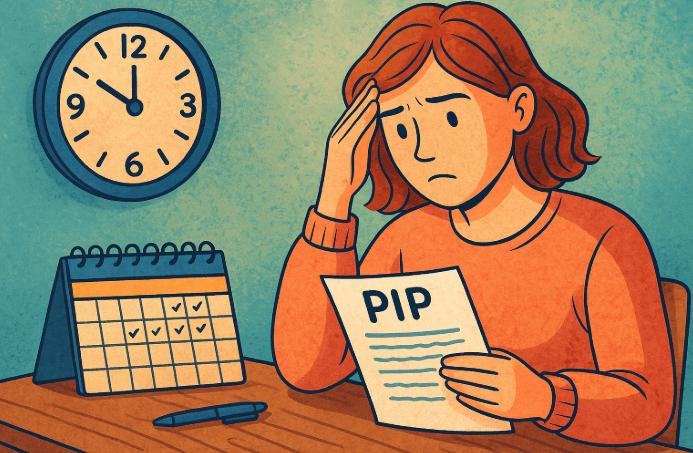
-
Fixed-term awards under 2 years: no review; simply end.
-
Fixed-term awards over 2 years: reviewed, usually about 1 year before expiry, via a review form.
-
Indefinite awards (conditions unlikely to change or over State Pension age): 10-year “light touch” reviews.
-
Medical assessments may happen at any time, though routine invites are unpredictable.
What Should You Do If Your PIP Stops Without a Letter?
Experiencing an unexpected stop in PIP payments without receiving a formal letter can be distressing. It’s important to act quickly, verify the situation, and take the right steps to reinstate or challenge the decision.
How to confirm if your PIP award ended or was suspended?
To check your current status;
-
Review your original award letter for end-date or review instructions
-
Check your bank statements
-
Log into your DWP online account for status updates.
- Check post and emails
If you’re unsure or can’t access your online account, contact the DWP helpline immediately.
What details should you request when calling the DWP helpline?
Call 0800 121 4433 and ask:
-
What is the official reason for the stoppage?
-
Was a decision letter issued? If yes, on what date?
-
Can they reissue the letter if it was lost or delayed?
-
Is it possible to reinstate the award or request backdated payments?
To make the conversation go more smoothly, prepare your bank information, award letter, and National Insurance number.
Can you ask the DWP to backdate missed payments?
Yes. If your payments stopped due to a valid reason—such as illness, hospitalization, postal delays, or mental health-related issues—you can request that any missed payments be backdated once the award is reinstated.
To improve your chances:
-
Submit written evidence (e.g. appointment letters, medical records, witness statements).
-
Include a cover letter explaining why you couldn’t respond or attend an assessment.
-
If appropriate, involve an adviser from Citizens Advice or a similar organization.
What is the new 4‑point rule for PIP? and How many points for PIP in 2025?
Starting from November 2026, a new rule will apply to all new PIP claimants and eventually to existing claimants during reassessment. The new 4-point rule means:
-
You must score at least 4 points on a single Daily Living activity to qualify for either the standard or enhanced Daily Living component.
-
This is in addition to the current requirement of scoring 8 or 12 points in total for an award.
The policy aims to target higher awards towards individuals with more concentrated and significant impairments, rather than those who score lower points across several areas.
Current claimants will not be reassessed under the new rule until their award comes up for review after November 2026.
How Do You Challenge a Decision to Stop PIP?
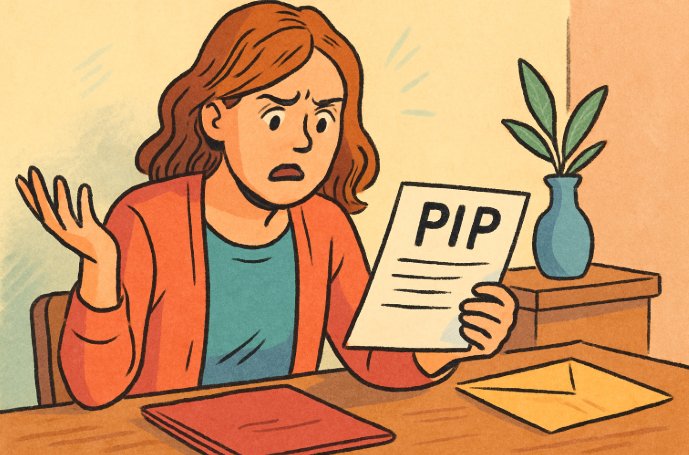
What is the process for a Mandatory Reconsideration (MR)?
-
You must request MR within 1 month of the decision letter
-
Write to the DWP outlining reasons and include evidence (GP letters, hospital notes, third-party reports)
-
The reviewer will either explain the judgement or reverse it in a Mandatory Reconsideration Notice (MRN).
How to prepare an appeal to the First-Tier Tribunal?
-
Submit appeal within 1 month of MRN
-
Include comprehensive evidence: medical reports, testimonies, assessment discrepancies
-
Attend Tribunal, present clearly how and why the DWP got the decision wrong
What supporting evidence strengthens your case?
-
GP/specialist letters detailing condition severity
-
Daily living or mobility diaries
-
Reports from personal assistants, occupational therapists, or family
-
Photographs (e.g. mobility aids or home challenges)
-
Community support assessments or home adaptations records
What Support Is Available If Your PIP Is Stopped Unexpectedly?
Can Citizens Advice or other charities help with appeals?
Yes. Several UK organizations provide free support to people navigating benefit appeals:
-
Citizens Advice: Help with form-filling, MR letters, and representation.
-
Scope: Support for people with disabilities, including casework advice.
-
Age UK: Specialist assistance for older adults facing benefit loss.
-
Disability Rights UK: Online resources and factsheets.
Are emergency funds or alternative benefits available?
If your PIP is stopped and you’re left without support:
-
You may be eligible for Universal Credit, especially with the Limited Capability for Work-Related Activity (LCWRA) element.
-
If you are unable to work, you may want to apply for Employment and Support Allowance (ESA).
-
Local councils may offer hardship funds, discretionary housing payments, or crisis grants to cover urgent expenses.
Contact your local authority or use Turn2Us to search for available grants.
Where to get legal advice for benefit challenges?
-
Law Centres provide free legal advice
-
Disability Law Service and specialist welfare rights solicitors
-
Some charities offer pro bono legal representation
Can You Prevent Unexpected PIP Stoppages in the Future?
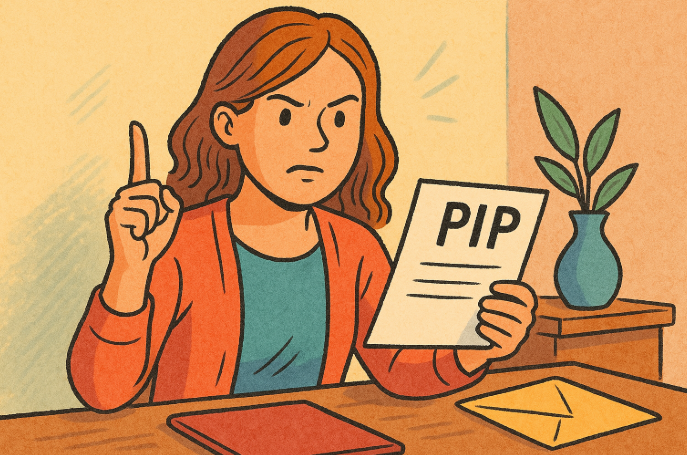
How to track your review or award end dates proactively?
To avoid sudden payment stops:
-
-
Note the award start and end dates listed in your original decision letter.
-
Set digital calendar alerts or reminders 3–6 months before the end date.
-
If you have not received a review form by the anticipated date, get in touch with the DWP.
Why is it crucial to promptly disclose any changes in one’s life?
If anything changes that might impact your eligibility, you must notify the DWP, including:
-
-
Hospital stays over 28 days
-
Moving into a care home or prison
-
Travel or residence outside the UK for over 4 weeks
-
An appreciable improvement or decline in your health
-
Should you keep a file of DWP letters and medical evidence?
Maintain copies of:
-
Award letters
-
Decision letters and Mandatory Reconsideration Notices
-
Appointment communications
-
Medical evidence—GP letters, hospital notes
Table – Reasons Why PIP Might Stop Without Notice and How to Respond
| Reason for Stoppage | Is Notice Given? | Best Response |
|---|---|---|
| Fixed‑term award expired | ❌ Rarely | Check award end date; call DWP; submit new claim or challenge |
| Unreturned review form | ❌ Sometimes | Request new form; explain delay; start MR if formal decision received |
| Missed assessment appointment | ❌ Sometimes | Rebook assessment; supply reasons; challenge any resulting decision |
| Hospital/prison/abroad | ⚠️ Varies | Report promptly; request reinstatement; provide supporting evidence |
| Fraud suspicion | ❌ Immediate | Gather evidence; use advice services; request MR or tribunal appeal |
What is the update on PIP 2025?
Key updates:
-
4‑point rule introduced (PIP reforms) from November 2026 (not 2025) for daily-living eligibility.
-
13-week transitional payments will be available for those who lose the daily-living component, giving breathing space after reassessment.
-
Universal Credit health element freeze and reduced entitlement from April 2026 onward.
Is the government stopping PIP?
The government is tightening eligibility, not stopping PIP outright:
-
Planned changes aim to exclude up to 800,000 people from the daily-living support by 2030.
-
Labour’s proposed Welfare Bill includes these reforms, with internal disagreement among MPs and advocacy groups.
-
PIP itself continues, but eligibility criteria will be more stringent.
Conclusion
Yes—PIP can be stopped without notification? under multiple circumstances, such as award expiry, missed forms, missed assessments, or life changes. However, claimants and advisers can challenge decisions and reinstate or backdate payments through proactive steps:
-
Track review deadlines and award end dates
-
Keep detailed records of all correspondence
-
Contact DWP immediately after any payment stop
-
Request a First-Tier Tribunal appeal or a Mandatory Reconsideration
-
Use support from charities and legal services
By staying informed and organised, claimants can protect their entitlement to PIP—even if payments stop unexpectedly.
FAQs
Can PIP be stopped without any formal letter?
Yes—especially if a fixed-term award has expired or review forms were missed. Often payments just stop.
What are common reasons for losing PIP without warning?
-
Award expiry
-
Missing review forms or assessments
-
Life changes like long hospital stays or moving abroad
How quickly should I act if my PIP stops?
Contact DWP immediately, ideally within 7 days. Then request any missed review documentation and gather evidence.
Is legal help available for benefit appeals?
Yes. Citizens Advice, Scope, Age UK, Law Centres, and specialist solicitors offer assistance—some for free.
Can PIP be reinstated if it stopped due to a mistake?
Yes—if you can prove you didn’t receive forms or letters, or if assessment scheduling errors occurred.
Related Posts:
Can I Claim PIP for Myself and Carer’s Allowance for My Son?
DWP £750 Payment Boost June 2025
DWP 300 Cost of Living Payment

I’m Adam Milne, a business writer and co-author at UKBusinessMag.co.uk. I’m passionate about simplifying complex topics—whether it’s tax, startup strategy, or digital marketing—so that entrepreneurs can take action with confidence. With years of experience in small business consultancy, I bring a practical perspective to every piece I write, helping readers turn ideas into results.

